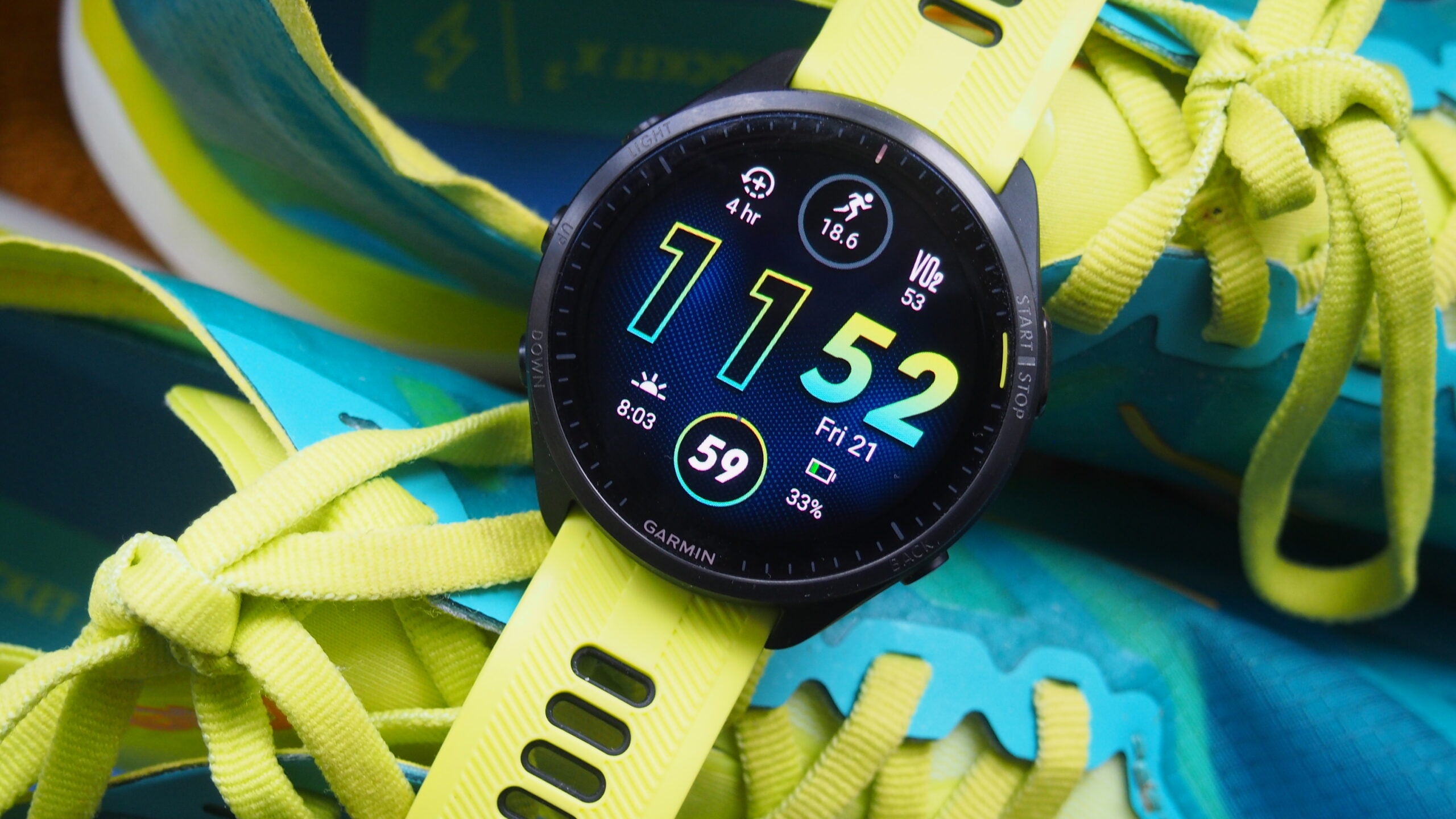Verdict
With the Garmin Forerunner 965 it really is all about the screen because with that aside, it’s offering the same features as the 955. If you’re desperate for a top-end Forerunner with a lovely colour display and that same great sports tracking and that still manages to deliver good battery, then you’ll be very happy here. If you can live without AMOLED, it’s not an essential upgrade.
Pros
- AMOLED screen is a great addition
- Battery life doesn’t suffer greatly from the new screen
- Still great all-round sports tracking
Cons
- Very similar features to the Garmin 955
- It’s more expensive than the 955
- No solar option
Availability
- UKRRP: £599.99
- USARRP: $599.99
- EuropeRRP: €649.99
- CanadaRRP: CA$799.99
- AustraliaRRP: AU$999
-
New, brighter AMOLED display:With an always-on mode available -
Multiband GPS mode and Sat IQ technology:Perfect for keeping track of where you are -
Up to 23-days of battery life:Designed with triathletes in mind
Introduction
The Garmin Forerunner 965 is the successor to the 955, Garmin’s top-end running watch that also has the multisports tracking skills that appeal to triathletes.
The headline upgrade is an AMOLED colour screen, joining the Garmin Forerunner 265, Epix and Venu series as Garmin decides to make its sports watches feel more like smartwatches.
Screen upgrade aside, Garmin is bolstering some running, cycling and outdoor smarts to make it a more complete watch that does, unsurprisingly, come in more expensive than the 955.
Does the new screen and added features make this one of the best running watches and an essential upgrade for 955 owners? Here’s our take.
Design and screen
- Slightly larger case than 955
- New AMOLED touchscreen display
- New titanium bezel
- Waterproof up to 50 metres
It’s fair to say the Forerunner 965 doesn’t exactly reinvent the wheel in terms of how it looks compared to the 955. It’s still undeniably sporty and does soak up similar space on your wrist even with that new AMOLED display.
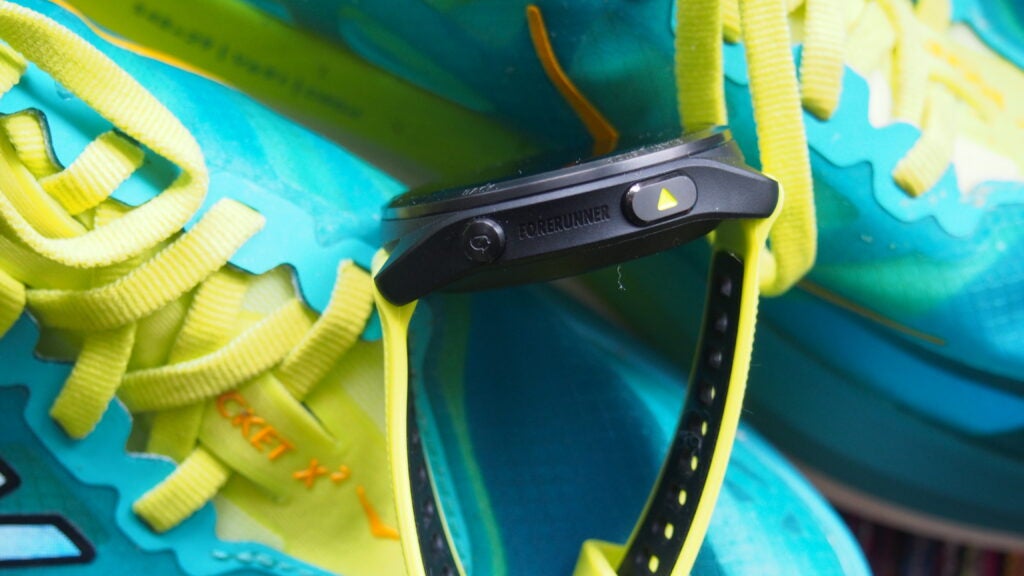
It’s a slightly larger 47mm case as opposed to a 46mm one, which sticks with a 22mm removable Quick-Fit silicone band and does upgrade the bezel to a titanium one as opposed to the polymer type we got on the 955. That’s been added without bringing significant extra weight to the 965. It’s only 53g up from 52g, so if you found the 955 perfectly manageable then you’ll find the same with the 965.
Moving on to the screen, the transflective display is gone, replaced with a larger, 1.4-inch, 454 x 454 resolution AMOLED screen that does support an always-on mode and includes a nicely responsive raise to wake recognition. Garmin’s transflective displays will always have the upper hand as far as handling brighter outdoor light conditions and that doesn’t really change here, but the 965’s display surely doesn’t struggle in that scenario either. It’s a screen that can go pretty bright and you do have to support to adjust the screen brightness here as well.
The 955 had a touchscreen as well, but the inclusion of that AMOLED panel does make its successor feel more like a smartwatch and it’s pleasing to swipe and tap on it. It’s responsive and doesn’t have any horrible signs of screen lag.
Like most Garmins there are five physical buttons dotted around that display and like the fellow AMOLED-packing 265, Garmin has made the main workout button more distinguishable and less likely to miss, even with sweaty fingers.
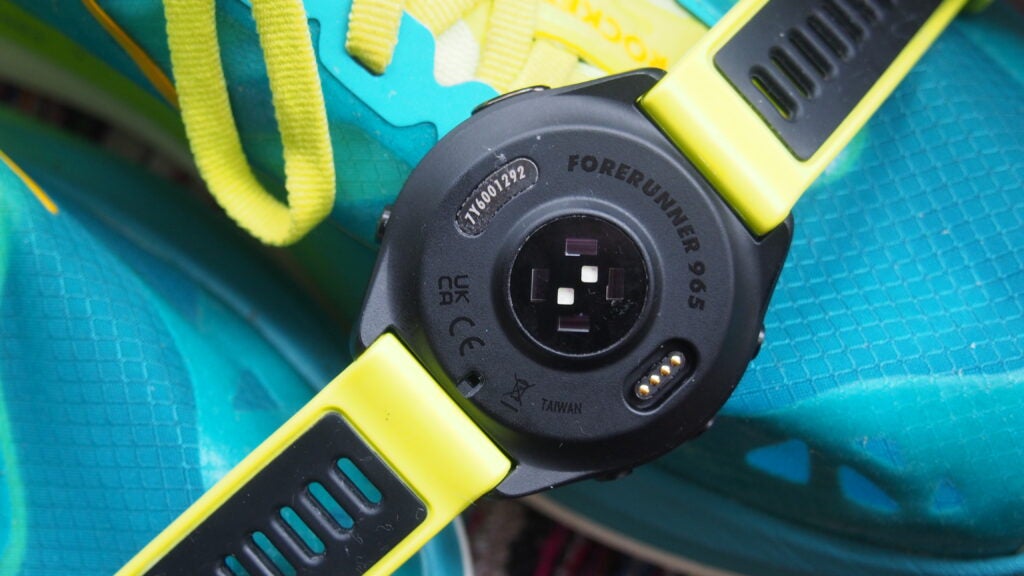
Something you don’t get on the 965 that you did get on the 955 is the PowerGlass lens, which adds solar power charging into the mix. If you spend a lot of time outdoors and live in sunnier climes, this might be a disappointment for you. If you don’t then the reality is that it’s not going to be a feature that you’ll miss.
Garmin doesn’t budge on waterproofing and storage here. It’s the same 5ATM-rated design (up to 50-metres depth) and 32GB of storage with a portion of that memory available for things like apps, workouts and mapping data.
Software and smartwatch features
- New UI animations
- Same smartwatch features as 955
- Garmin Pay and Connect IQ access
From a smartwatch features point of view, the 965 is incredibly similar to the 955, with the crucial difference being that you now have a nicer colour screen that does make those features feel a little more intuitive.
Reading and viewing notifications at a glance, using the music controls and looking at the watch faces – all of it just feels elevated by that screen. I tested it with an iPhone 14 and a Google Pixel 6a and the experience across the two phone platforms was pretty consistent overall. I had no syncing or pairing issues at all during that time.
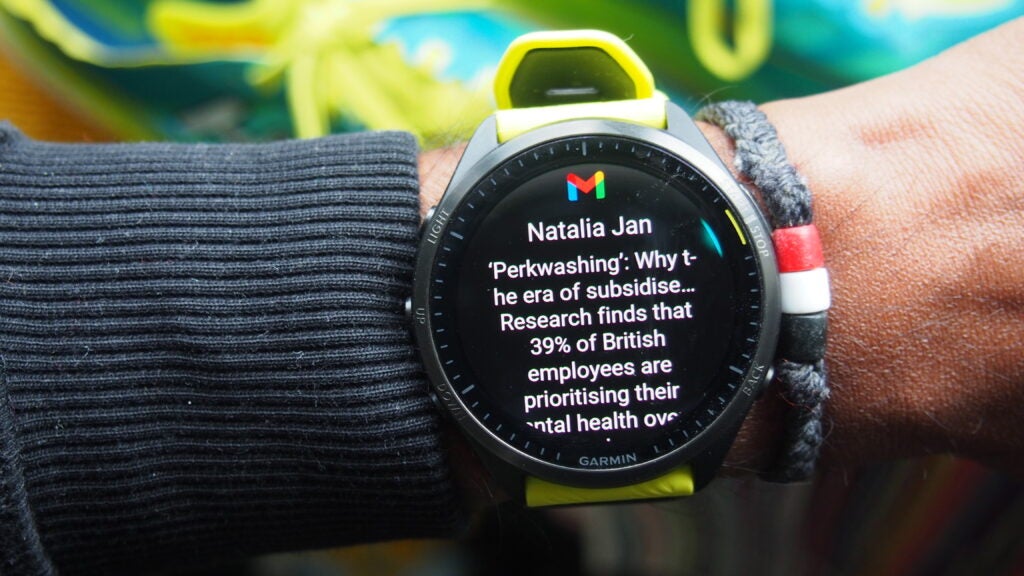
You do get most of what Garmin has to offer on the smartwatch front. It does have Garmin Pay, but it’s by no means the slickest or well supported of the watch payment platforms out there. It doesn’t include the voice features that you get on the Venu 2 Plus, which will let you access your phone’s smart assistant and make calls over Bluetooth, though I can’t say those are features that I really missed or felt I was missing out on.
If you want a sports watch that offers good notification support, music features and does give you access to Garmin’s Connect IQ store to bolster it with data fields, widgets, some apps and additional watch faces, then the 965 does plenty right here.
Fitness tracking
- Wrist-based running dynamics
- NextFork navigation
- New cardio workout modes
The 965 is aimed at runners first and foremost and along with bringing back everything that was on the 955, it’s also added the ability to track running dynamics without needing an additional sensor. That means you can now see insights such as stride length, vertical ratio and vertical oscillation for those who want to delve deeper into metrics related to running form and technique.
I used it alongside Garmin’s own HRM-Pro heart rate monitor strap, which can also deliver similar metrics, and found they offered mostly identical data. What it does lack however is some useful actionable instructions to put that data to good use, which is hopefully something that Garmin introduces over time.
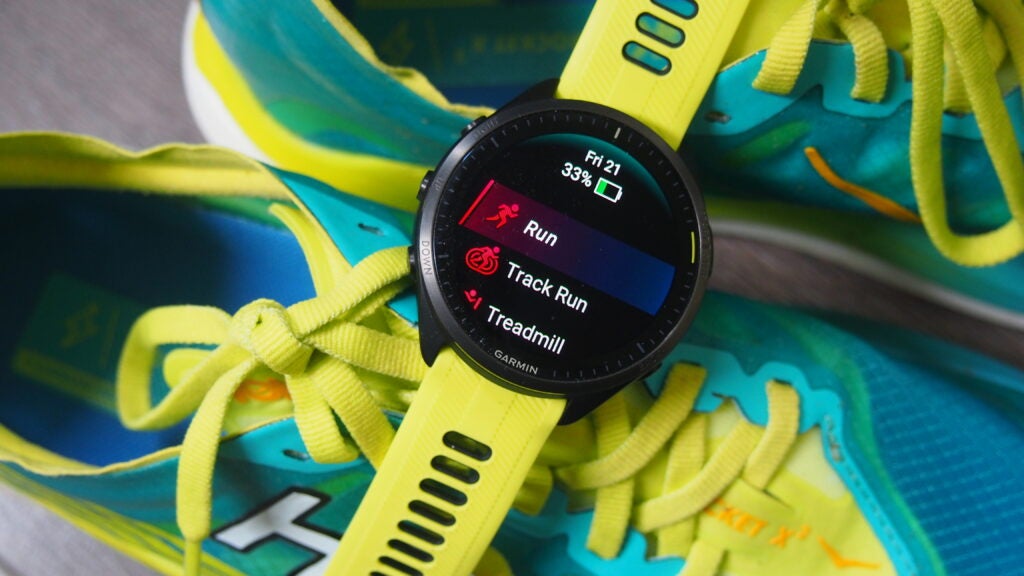
Other extras fall in the outdoor, cycling and gym modes with a new cardio workout mode, a new NextFork navigation mode and power guide, power curve and % FTP workouts for cyclists, which have already been added to other watches in Garmin’s collection.
Outside of those extras, you can expect a similar performance to what we got on the 955. The new, more accurate multiband GPS mode noticeably improves tracking accuracy in typically problematic areas. Heart rate performance coped well against a chest strap for steady workouts but had some slightly more sketchy moments on quicker workouts with maximum heart rates, which I think is partly down to the case size as this is something I’ve seen on other bigger Garmin watches as well.
Tracking for activities like swimming and indoor workouts, like indoor rowing, was solid too, and the mapping support is elevated by that colour screen, though it can be a touch slow to load other sections of the map as you swipe to them. The maps look great on that screen and you can really pick out good detail here. You’re now getting the best mapping support on a sports watch, with the added bonus of a colour screen.
Then you have all of those rich Garmin training and analysis features to turn to that are all the same ones from the 955. There’s Training Readiness and Morning report modes to make sure you’re tackling the right type of training each day, an improved interval training mode for runners, access to Garmin Coach, a race predictor, daily suggested workouts and the ability to chase down Garmin and Strava Live segments.
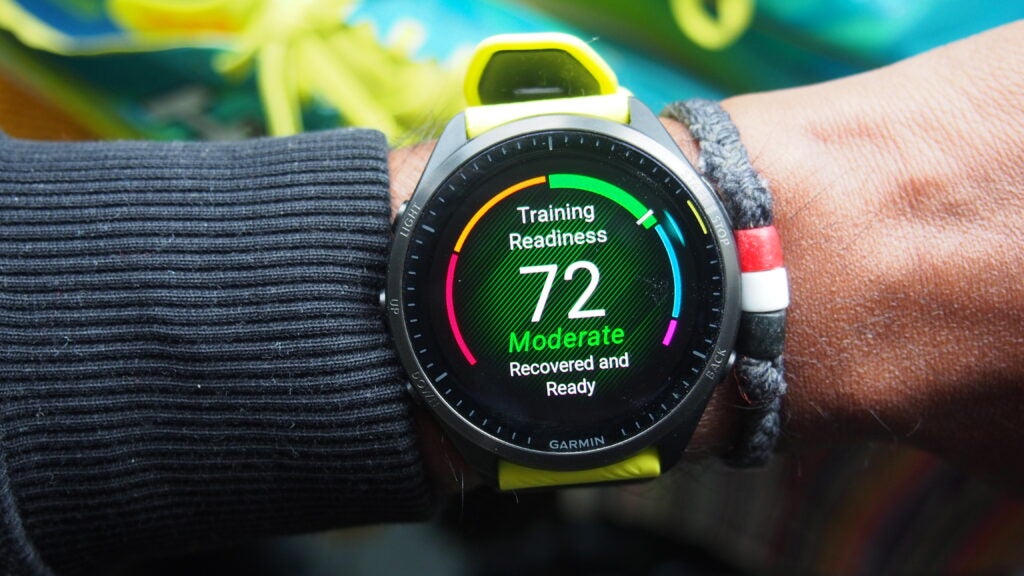
Whether you want to go heavy or light on insights, the 965 is just like the 955 in that it gives you that freedom. It’s another feature-packed sports watch with a strong running edge.
Battery life
- Up to 23-days in smartwatch mode
- Up to 31-hours GPS battery life
- Up to 19-hours in top multiband GPS mode
Arguably one of the biggest talking points of the 965 is the battery life. AMOLED screens demand more battery than the transflective ones that Garmin has traditionally used on its watches, so there are going to be some sacrifices made here.
Garmin has already added AMOLED displays to other watches in its collection and while they’ve not matched the battery performance of its older wearables, they’ve still fared pretty well.
With the 965 you’re seeing improvements in some scenarios and not so much in others. In general smartwatch mode you can expect up to 23-days of use, up from 15 to 20-days on the 955. The normal GPS battery life is a maximum of 31-hours compared to the 955’s 42 hours, so that’s a drop in performance. It drops again when using the top multiband GPS mode, going from 20-hours to 19-hours.
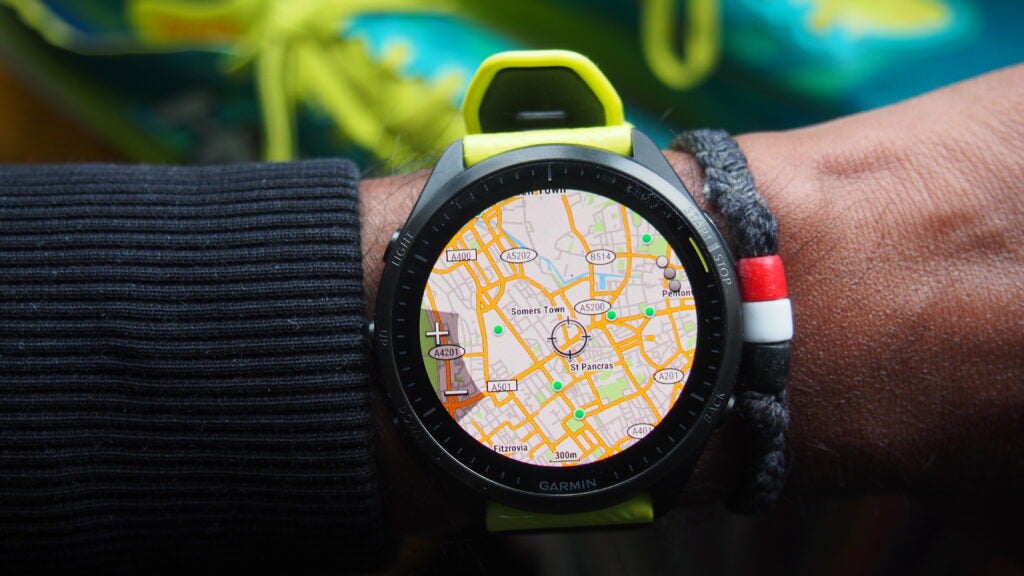
If you choose to use the screen in the optional always-on mode then Garmin claims you’ll get up to 7-days of battery life, which is more than you’ll get from the Apple Watch 8 or the Samsung Galaxy Watch 5.
I would say based on my testing time that in heavy use, this is still a watch that’s good for a week. That heavy use would involve regular invoking the top multiband GPS mode, a mix of having the screen set to always-on and using the raise to wake feature, receiving notifications on a daily basis and having the continuous monitoring support enabled for things like heart rate.
For over an hour of running with the multiband GPS mode in use, and using the navigation and mapping support, the battery dropped by 20% so it’s worth mentioning that that improved accuracy does come at a cost to the battery.
Daily drop-off outside of tracking time when the screen isn’t set to always-on isn’t huge either, so if you’re willing to forgo the top GPS tracking mode and not have the screen set to always-on then the watch can push through to a couple of weeks. Under heavier usage, it won’t. Garmin does also include some power manager mode features here with a battery saver mode to help you get a little more life out of it however.
Latest deals
Should you buy it?
You want a top Garmin watch with a colour screen: If you want a Garmin with full mapping on a colour screen for less, then the 965 is going to appeal.
You have a 955 and will take more battery over a colour screen: Outside of the screen, the 965 doesn’t offer a huge amount over the older 955 so it’s not going to be a necessary upgrade for a lot of people.
Final Thoughts
Like the Forerunner 265s, Garmin has added a great colour screen to one of its best sports watches and it’s been a joy to live with. If you use it in the always-on screen mode then you’ll have to sacrifice the longer battery life that could be enjoyed on its predecessor. If you’re happy to live without a screen on 24/7, then it’ll get you through a good solid week of serious training and I think that’s going to be good enough for most in exchange for a more smartwatch-style feeling sports watch.
If you’re not that fussed about the AMOLED panel however, then the Garmin Forerunner 955 can still get the job done, and at a cheaper rate.
How we test
We thoroughly test every smartwatch we review. We use industry standard testing to compare features properly and we use the watch as our main device over the review period. We’ll always tell you what we find and we never, ever, accept money to review a product.
Worn as our main tracker during the testing period
Heart rate data compared against dedicated heart rate devices
FAQs
The Garmin Forerunner 965 does have a built-in music player to store and sync over music from streaming services like Spotify and Deezer.
The Garmin Forerunner doesn’t have an ECG sensor. Currently, the Garmin Venu 2 Plus is the only Garmin watch that offers an ECG sensor.
Sustainability
TrustedReviews’ holds the fact that global warming is not a myth as a core value and will continuously endeavor to help protect our planet from harm in its business practices.
As part of this mission, whenever we review a product we send the company a series of questions to help us gauge and make transparent the impact the device has on the environment.
We currently haven’t received answers to the questions on this product, but will update this page the moment we do. You can see a detailed breakdown of the questions we ask and why in our sustainability info page.
Jargon buster
BPM
An abbreviation of ‘beats per minute’, used to describe the pace of someone’s heartbeat as recorded by a smartwatch or some other wearable.
Verdict
With the Garmin Forerunner 965 it really is all about the screen because with that aside, it’s offering the same features as the 955. If you’re desperate for a top-end Forerunner with a lovely colour display and that same great sports tracking and that still manages to deliver good battery, then you’ll be very happy here. If you can live without AMOLED, it’s not an essential upgrade.
Pros
- AMOLED screen is a great addition
- Battery life doesn’t suffer greatly from the new screen
- Still great all-round sports tracking
Cons
- Very similar features to the Garmin 955
- It’s more expensive than the 955
- No solar option
Availability
- UKRRP: £599.99
- USARRP: $599.99
- EuropeRRP: €649.99
- CanadaRRP: CA$799.99
- AustraliaRRP: AU$999
-
New, brighter AMOLED display:With an always-on mode available -
Multiband GPS mode and Sat IQ technology:Perfect for keeping track of where you are -
Up to 23-days of battery life:Designed with triathletes in mind
Introduction
The Garmin Forerunner 965 is the successor to the 955, Garmin’s top-end running watch that also has the multisports tracking skills that appeal to triathletes.
The headline upgrade is an AMOLED colour screen, joining the Garmin Forerunner 265, Epix and Venu series as Garmin decides to make its sports watches feel more like smartwatches.
Screen upgrade aside, Garmin is bolstering some running, cycling and outdoor smarts to make it a more complete watch that does, unsurprisingly, come in more expensive than the 955.
Does the new screen and added features make this one of the best running watches and an essential upgrade for 955 owners? Here’s our take.
Design and screen
- Slightly larger case than 955
- New AMOLED touchscreen display
- New titanium bezel
- Waterproof up to 50 metres
It’s fair to say the Forerunner 965 doesn’t exactly reinvent the wheel in terms of how it looks compared to the 955. It’s still undeniably sporty and does soak up similar space on your wrist even with that new AMOLED display.

It’s a slightly larger 47mm case as opposed to a 46mm one, which sticks with a 22mm removable Quick-Fit silicone band and does upgrade the bezel to a titanium one as opposed to the polymer type we got on the 955. That’s been added without bringing significant extra weight to the 965. It’s only 53g up from 52g, so if you found the 955 perfectly manageable then you’ll find the same with the 965.
Moving on to the screen, the transflective display is gone, replaced with a larger, 1.4-inch, 454 x 454 resolution AMOLED screen that does support an always-on mode and includes a nicely responsive raise to wake recognition. Garmin’s transflective displays will always have the upper hand as far as handling brighter outdoor light conditions and that doesn’t really change here, but the 965’s display surely doesn’t struggle in that scenario either. It’s a screen that can go pretty bright and you do have to support to adjust the screen brightness here as well.
The 955 had a touchscreen as well, but the inclusion of that AMOLED panel does make its successor feel more like a smartwatch and it’s pleasing to swipe and tap on it. It’s responsive and doesn’t have any horrible signs of screen lag.
Like most Garmins there are five physical buttons dotted around that display and like the fellow AMOLED-packing 265, Garmin has made the main workout button more distinguishable and less likely to miss, even with sweaty fingers.

Something you don’t get on the 965 that you did get on the 955 is the PowerGlass lens, which adds solar power charging into the mix. If you spend a lot of time outdoors and live in sunnier climes, this might be a disappointment for you. If you don’t then the reality is that it’s not going to be a feature that you’ll miss.
Garmin doesn’t budge on waterproofing and storage here. It’s the same 5ATM-rated design (up to 50-metres depth) and 32GB of storage with a portion of that memory available for things like apps, workouts and mapping data.
Software and smartwatch features
- New UI animations
- Same smartwatch features as 955
- Garmin Pay and Connect IQ access
From a smartwatch features point of view, the 965 is incredibly similar to the 955, with the crucial difference being that you now have a nicer colour screen that does make those features feel a little more intuitive.
Reading and viewing notifications at a glance, using the music controls and looking at the watch faces – all of it just feels elevated by that screen. I tested it with an iPhone 14 and a Google Pixel 6a and the experience across the two phone platforms was pretty consistent overall. I had no syncing or pairing issues at all during that time.

You do get most of what Garmin has to offer on the smartwatch front. It does have Garmin Pay, but it’s by no means the slickest or well supported of the watch payment platforms out there. It doesn’t include the voice features that you get on the Venu 2 Plus, which will let you access your phone’s smart assistant and make calls over Bluetooth, though I can’t say those are features that I really missed or felt I was missing out on.
If you want a sports watch that offers good notification support, music features and does give you access to Garmin’s Connect IQ store to bolster it with data fields, widgets, some apps and additional watch faces, then the 965 does plenty right here.
Fitness tracking
- Wrist-based running dynamics
- NextFork navigation
- New cardio workout modes
The 965 is aimed at runners first and foremost and along with bringing back everything that was on the 955, it’s also added the ability to track running dynamics without needing an additional sensor. That means you can now see insights such as stride length, vertical ratio and vertical oscillation for those who want to delve deeper into metrics related to running form and technique.
I used it alongside Garmin’s own HRM-Pro heart rate monitor strap, which can also deliver similar metrics, and found they offered mostly identical data. What it does lack however is some useful actionable instructions to put that data to good use, which is hopefully something that Garmin introduces over time.

Other extras fall in the outdoor, cycling and gym modes with a new cardio workout mode, a new NextFork navigation mode and power guide, power curve and % FTP workouts for cyclists, which have already been added to other watches in Garmin’s collection.
Outside of those extras, you can expect a similar performance to what we got on the 955. The new, more accurate multiband GPS mode noticeably improves tracking accuracy in typically problematic areas. Heart rate performance coped well against a chest strap for steady workouts but had some slightly more sketchy moments on quicker workouts with maximum heart rates, which I think is partly down to the case size as this is something I’ve seen on other bigger Garmin watches as well.
Tracking for activities like swimming and indoor workouts, like indoor rowing, was solid too, and the mapping support is elevated by that colour screen, though it can be a touch slow to load other sections of the map as you swipe to them. The maps look great on that screen and you can really pick out good detail here. You’re now getting the best mapping support on a sports watch, with the added bonus of a colour screen.
Then you have all of those rich Garmin training and analysis features to turn to that are all the same ones from the 955. There’s Training Readiness and Morning report modes to make sure you’re tackling the right type of training each day, an improved interval training mode for runners, access to Garmin Coach, a race predictor, daily suggested workouts and the ability to chase down Garmin and Strava Live segments.

Whether you want to go heavy or light on insights, the 965 is just like the 955 in that it gives you that freedom. It’s another feature-packed sports watch with a strong running edge.
Battery life
- Up to 23-days in smartwatch mode
- Up to 31-hours GPS battery life
- Up to 19-hours in top multiband GPS mode
Arguably one of the biggest talking points of the 965 is the battery life. AMOLED screens demand more battery than the transflective ones that Garmin has traditionally used on its watches, so there are going to be some sacrifices made here.
Garmin has already added AMOLED displays to other watches in its collection and while they’ve not matched the battery performance of its older wearables, they’ve still fared pretty well.
With the 965 you’re seeing improvements in some scenarios and not so much in others. In general smartwatch mode you can expect up to 23-days of use, up from 15 to 20-days on the 955. The normal GPS battery life is a maximum of 31-hours compared to the 955’s 42 hours, so that’s a drop in performance. It drops again when using the top multiband GPS mode, going from 20-hours to 19-hours.

If you choose to use the screen in the optional always-on mode then Garmin claims you’ll get up to 7-days of battery life, which is more than you’ll get from the Apple Watch 8 or the Samsung Galaxy Watch 5.
I would say based on my testing time that in heavy use, this is still a watch that’s good for a week. That heavy use would involve regular invoking the top multiband GPS mode, a mix of having the screen set to always-on and using the raise to wake feature, receiving notifications on a daily basis and having the continuous monitoring support enabled for things like heart rate.
For over an hour of running with the multiband GPS mode in use, and using the navigation and mapping support, the battery dropped by 20% so it’s worth mentioning that that improved accuracy does come at a cost to the battery.
Daily drop-off outside of tracking time when the screen isn’t set to always-on isn’t huge either, so if you’re willing to forgo the top GPS tracking mode and not have the screen set to always-on then the watch can push through to a couple of weeks. Under heavier usage, it won’t. Garmin does also include some power manager mode features here with a battery saver mode to help you get a little more life out of it however.
Latest deals
Should you buy it?
You want a top Garmin watch with a colour screen: If you want a Garmin with full mapping on a colour screen for less, then the 965 is going to appeal.
You have a 955 and will take more battery over a colour screen: Outside of the screen, the 965 doesn’t offer a huge amount over the older 955 so it’s not going to be a necessary upgrade for a lot of people.
Final Thoughts
Like the Forerunner 265s, Garmin has added a great colour screen to one of its best sports watches and it’s been a joy to live with. If you use it in the always-on screen mode then you’ll have to sacrifice the longer battery life that could be enjoyed on its predecessor. If you’re happy to live without a screen on 24/7, then it’ll get you through a good solid week of serious training and I think that’s going to be good enough for most in exchange for a more smartwatch-style feeling sports watch.
If you’re not that fussed about the AMOLED panel however, then the Garmin Forerunner 955 can still get the job done, and at a cheaper rate.
How we test
We thoroughly test every smartwatch we review. We use industry standard testing to compare features properly and we use the watch as our main device over the review period. We’ll always tell you what we find and we never, ever, accept money to review a product.
Worn as our main tracker during the testing period
Heart rate data compared against dedicated heart rate devices
FAQs
The Garmin Forerunner 965 does have a built-in music player to store and sync over music from streaming services like Spotify and Deezer.
The Garmin Forerunner doesn’t have an ECG sensor. Currently, the Garmin Venu 2 Plus is the only Garmin watch that offers an ECG sensor.
Sustainability
TrustedReviews’ holds the fact that global warming is not a myth as a core value and will continuously endeavor to help protect our planet from harm in its business practices.
As part of this mission, whenever we review a product we send the company a series of questions to help us gauge and make transparent the impact the device has on the environment.
We currently haven’t received answers to the questions on this product, but will update this page the moment we do. You can see a detailed breakdown of the questions we ask and why in our sustainability info page.
Jargon buster
BPM
An abbreviation of ‘beats per minute’, used to describe the pace of someone’s heartbeat as recorded by a smartwatch or some other wearable.


















